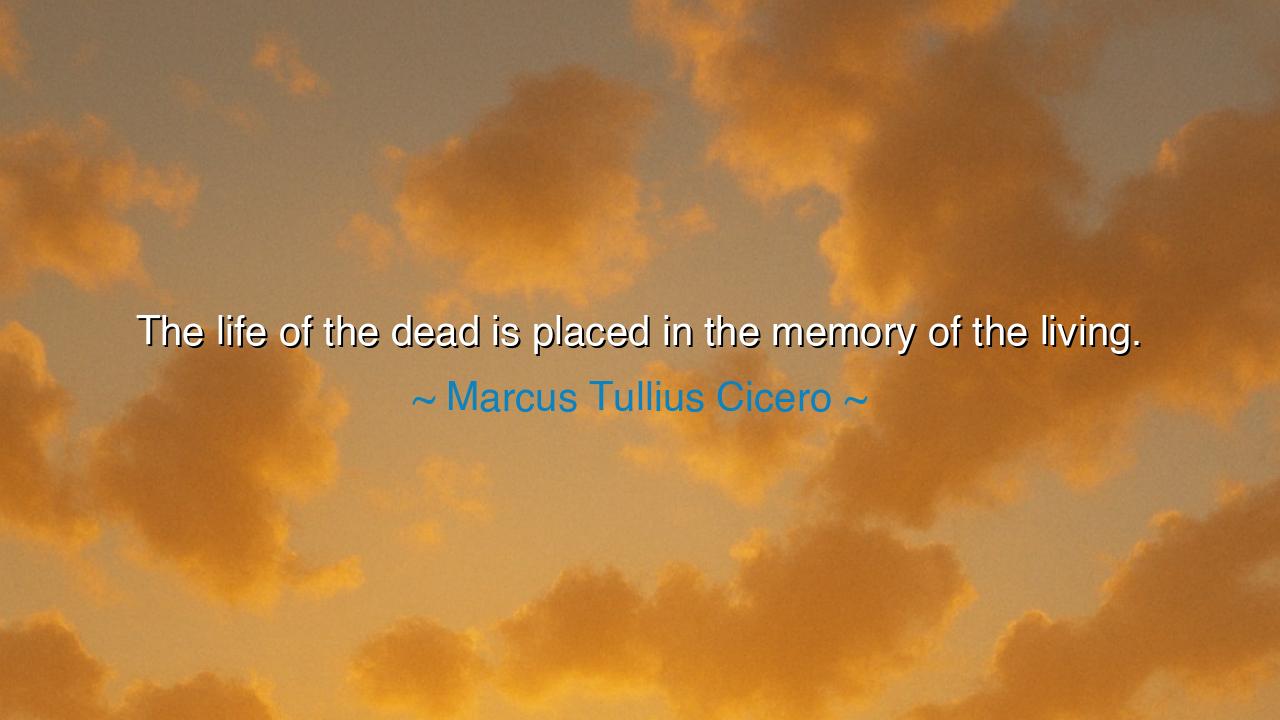
The life of the dead is placed in the memory of the living.






"The life of the dead is placed in the memory of the living." – Marcus Tullius Cicero
So spoke Cicero, the great Roman orator, philosopher, and guardian of moral truth. In these immortal words, he revealed the sacred bridge between the realms of the living and the dead — that death does not end life, it only transfers it into another form: memory. The body may perish, the voice may fall silent, but the essence of one’s being endures in the hearts of those who remember. This is not mere sentiment; it is the eternal covenant of human existence — that we live on through remembrance, and that memory is the temple where souls continue to dwell.
The origin of this saying lies in Cicero’s reflections on friendship, duty, and mortality. Living in an age of political turmoil, betrayal, and loss, he witnessed many noble men cut down by fate and tyranny. Yet he believed that virtue could not be destroyed by the sword. For when we remember the good, when we speak their names with reverence, we grant the dead a second life — not of flesh, but of spirit. Memory, to Cicero, was not a mere recollection; it was an act of moral responsibility. To forget the dead was to betray them; to remember them was to let their courage and love continue shaping the world.
Look, for instance, to the story of Hector of Troy, the noble defender of his city. When he fell beneath Achilles’ wrath, his body was returned to Troy, but his soul lived on — not in stone or tomb, but in the songs of his people. For centuries, poets have sung of his valor, his tenderness as a father, his loyalty as a husband, and his bravery as a warrior. Through these memories, Hector still walks among us; he still teaches us what it means to love one’s home more than one’s life. Thus, the ancients knew well what Cicero proclaimed: to be remembered is to remain alive.
The memory of the dead is also the conscience of the living. When we recall their sacrifices — the soldiers who fell for freedom, the mothers who gave all for their children, the thinkers who labored for truth — we are reminded of what it means to live rightly. Their memory becomes our compass. Forgetfulness, on the other hand, breeds decay. A nation that forgets its heroes loses its soul; a person who forgets their ancestors wanders without roots. Memory is the soil from which gratitude and identity grow.
But remembrance is not a passive act. To truly honor the dead, one must live in a way that continues their unfinished work. Each time we show kindness, each time we pursue justice, each time we refuse to yield to despair, we keep alive those who once did the same. The stories of their courage whisper in our hearts, urging us onward. In this way, we do not merely remember — we become the continuation of their life. The living carry the torch that the dead once bore, ensuring its flame never goes out.
Think of Anne Frank, whose brief life was extinguished by cruelty, yet whose words have outlived empires. Her diary, preserved by memory and love, has become a mirror for humanity — a reminder of hope’s endurance amid horror. Though her body rests in the grave, her thoughts breathe still in every soul that reads her story. In her, Cicero’s truth lives perfectly: the life of the dead is placed in the memory of the living — and through that memory, becomes immortal.
So, my children, hold fast to your memories. Speak often the names of those you have loved and lost. Tell their stories, not with sorrow alone, but with pride and joy. For as long as you do, they remain beside you — unseen, yet ever near. In remembering them, you also remember who you are, and what greatness humanity is capable of.
Lesson: To live fully, one must honor the past. Remember the dead not only in grief but in gratitude. Let their virtues guide your choices, their dreams inspire your own, and their sacrifices remind you that life is sacred. For when we remember rightly, death becomes not an ending, but a transformation — and the river of human spirit flows, unbroken, from generation to generation.






AAdministratorAdministrator
Welcome, honored guests. Please leave a comment, we will respond soon